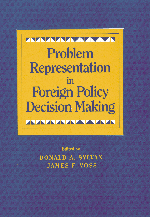Crossref Citations
This Book has been
cited by the following publications. This list is generated based on data provided by Crossref.
Smith, Craig R.
2001.
Patterns of Suppression in Times of Crisis.
Free Speech Yearbook,
Vol. 39,
Issue. 1,
p.
8.
Schafer, Mark
2003.
Science, Empiricism, and Tolerance in the Study of Foreign Policymaking.
International Studies Review,
Vol. 5,
Issue. 2,
p.
155.
Garrison, Jean A.
2003.
Foreign Policy Analysis and Globalization: Public Opinion, World Opinion, and the Individual by Foyle1.
International Studies Review,
Vol. 5,
Issue. 2,
p.
155.
Kaarbo, Juliet
2003.
Foreign Policy Analysis in the Twenty-First Century: Back to Comparison, Forward to Identity and Ideas.
International Studies Review,
Vol. 5,
Issue. 2,
p.
155.
Mowle, Thomas S.
2003.
Worldviews in Foreign Policy: Realism, Liberalism, and External Conflict.
Political Psychology,
Vol. 24,
Issue. 3,
p.
561.
Foyle, Douglas
2003.
Foreign Policy Analysis and Globalization: Public Opinion, World Opinion, and the Individual.
International Studies Review,
Vol. 5,
Issue. 2,
p.
155.
Garrison, Jean A.
2003.
Foreign Policymaking and Group Dynamics: Where We've Been and Where We're Going.
International Studies Review,
Vol. 5,
Issue. 2,
p.
155.
Stern, Eric K.
2003.
Crisis Studies and Foreign Policy Analysis: Insights, Synergies, and Challenges.
International Studies Review,
Vol. 5,
Issue. 2,
p.
155.
Beer, Francis A
Healy, Alice F
and
Bourne, Lyle E
2004.
Advances in Political Psychology Volume 1.
Vol. 1,
Issue. ,
p.
139.
Sylvan, Donald A.
Keller, Jonathan W.
and
Haftel, Yoram Z.
2004.
Forecasting Israeli–Palestinian Relations.
Journal of Peace Research,
Vol. 41,
Issue. 4,
p.
445.
Stern, Eric
2004.
Contextualizing and Critiquing the Poliheuristic Theory.
Journal of Conflict Resolution,
Vol. 48,
Issue. 1,
p.
105.
PETERSON, M. J.
2004.
Diverging Orbits: Situation Definitions in Creation of Regimes for Broadcast and Remote Sensing Satellites.
American Political Science Review,
Vol. 98,
Issue. 2,
p.
277.
East, Maurice A.
and
Hermann, Charles F.
2005.
Assessing a Mediated Learning Joint Television Course: Foreign Policy Problem Management in the First Bush Administration1.
International Studies Perspectives,
Vol. 6,
Issue. 4,
p.
462.
Sylvan, Donald A.
Grove, Andrea
and
Martinson, Jeffrey D.
2005.
Problem Representation and Conflict Dynamics in the Middle East and Northern Ireland.
Foreign Policy Analysis,
Vol. 1,
Issue. 3,
p.
279.
Crichlow, Scott
2005.
Psychological Influences on the Policy Choices of Secretaries of State and Foreign Ministers.
Cooperation and Conflict,
Vol. 40,
Issue. 2,
p.
179.
Keller, Jonathan W.
2005.
Leadership Style, Regime Type, and Foreign Policy Crisis Behavior: A Contingent Monadic Peace?.
International Studies Quarterly,
Vol. 49,
Issue. 2,
p.
205.
Drulák, Petr
2006.
Motion, Container and Equilibrium: Metaphors in the Discourse about European Integration.
European Journal of International Relations,
Vol. 12,
Issue. 4,
p.
499.
OZKECECI-TANER, BINNUR
2006.
Reviewing the Literature on Sequential/Dynamic Foreign Policy Decision Making.
International Studies Review,
Vol. 8,
Issue. 3,
p.
545.
Lobell, Steven E.
2006.
The International Realm, Framing Effects, and Security Strategies: Britain in Peace and War.
International Interactions,
Vol. 32,
Issue. 1,
p.
27.
Dyson, Stephen Benedict
and
Preston, Thomas
2006.
Individual Characteristics of Political Leaders and the Use of Analogy in Foreign Policy Decision Making.
Political Psychology,
Vol. 27,
Issue. 2,
p.
265.





